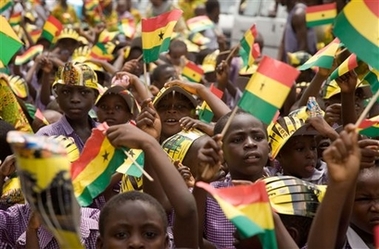Ghana observes 50 years of independence
(AP)Updated: 2007-03-06 11:34
ACCRA, Ghana - Ruth Botsio recalls with misty-eyed wonder the jubilation and triumphant cries of "Freedom! Freedom! Freedom!" that greeted the birth of sub-Saharan Africa's first nation to win independence from Europe.
 School children wave their Ghanaian flags, ahead of Ghana's 50 year independent celebrations at Accra, Ghana, Monday, March 5, 2007. [AP]  |
The West African nation's Golden Jubilee on Tuesday is prompting some sober reflection on why Africa has failed to translate its dreams, and its bounty of mineral and agricultural resources, into wealth.
"It was so emotional," Botsio, who just celebrated her 80th birthday, said of celebrations 50 years ago. Her late husband, Kojo Botsio, was one of the architects of Ghana's independence movement and a Cabinet minister in the first government following freedom from British rule.
Kwame Nkrumah, independent Ghana's first leader, dreamed of pan-African power that would free blacks from reliance on whites.
Today, President John Kufuor would be happy to see the country leap the gap from poor to middle class; the urban poor dream of a steady job and coming home to running water and electric lights.
Ghana was producing 10 percent of the world's gold when it became independent and had a similar gross domestic product per person to South Korea. Today, South Korea's GDP per head has soared to $16,000 a year, while Ghana's is about $550.
Some Ghanaians see little to celebrate.
"I'm supposed to be happy about struggling to make ends meet?" asked Kwesi Boateng, who drives a taxi because his teaching job paid less than $250 a month, not enough to support his wife and two children.
"Am I happy that I haven't had running water for three months? Happy that when I finish work at night, my home is more likely in darkness than light? Why should I be happy?" he asked, more weary than angry.
Ghana's seaside capital, Accra, is suffering increasing power outages - including one that plunged the airport briefly into darkness and silenced a band welcoming people to the independence celebrations. Some say it's because the hydroelectric dam built under Nkrumah cannot produce enough power due to poor rains; others blame an aluminum smelter that recently returned to service and is gobbling up more than its share of the limited electricity available.
Tens of thousands of people in Accra have no running water and heft buckets and cans from water pumps to their homes.
Among those boycotting Tuesday's celebrations are members of Nkrumah's Convention People's Party, who say his legacy is not being given its due, and Flight Lt. Jerry Rawlings, a former coup leader and president whom Kufuor last year accused of plotting yet another overthrow.
Rawlings said Monday that Ghana confronts "pervasive corruption at all levels, missed opportunities for genuine progress, nepotism, tribalism and known cases of political torture and killings."
Kufuor has won international acclaim for building democracy in the nation of about 20 million.
The chief executive of independence celebrations, Charles Wereko-Brobbey,
said Ghana's politicians still are "learning democracy" and that "it's only (in
the past) 10 years have had the kind of pluralism that allows people to speak
their minds."
| 1 | 2 |  |
|
||
|
||
|
|